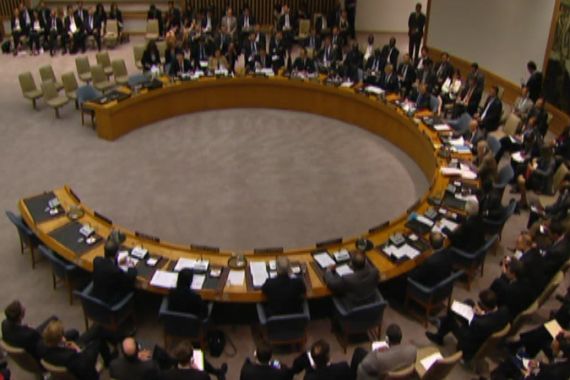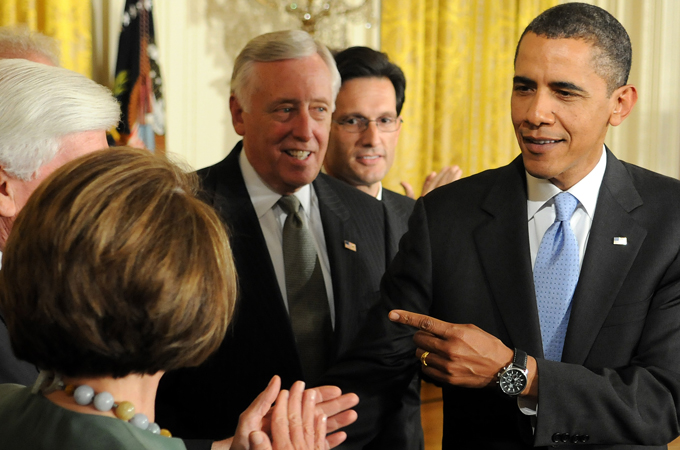Does Obama understand what’s been unleashed?
In response to an alleged assassination plot, Washington plans to impose even tougher sanctions on Iran.

 |
| US President Barack Obama greets congressional leadership before signing the Iran Sanctions Bill [EPA] |
A week after news of an alleged Iranian assassination plot in Washington rocked the international scene, public details remain scant. The Obama administration – including the president himself – has spoken with unequivocal certitude regarding the Iranian government’s intentions and involvement. But until he uses the same level of candour to publicly disclose detailed evidence, we will not know anything beyond allegations. Pundits will continue speculating with whodunnit analysis that constructs an incomplete puzzle, but engaging in hypotheticals does not paint a clearer picture. More telling are the increasingly dangerous geopolitical ramifications of this crisis.
Almost immediately after announcing the alleged plot, the Obama administration kicked off a full-court press in Congress and at the United Nations to coordinate amplified domestic and international pressure on Iran. There was nothing surprising about the administration’s decision to push for new sanctions. It’s what we always do, regardless of the results.
Sanctions have been explained by successive US administrations as punishment for Iran’s state sponsorship of terrorism – and more recently, doubts in Washington surrounding the intent of Iran’s nuclear program. New broad-based sanctions on Iran for (publicly unsubstantiated) allegations have raised eyebrows even inside the Obama administration.
Here’s the bottom line: Indiscriminate sanctions are meant to change Iran’s strategic calculus to such a degree that the costs of maintaining its current policy trajectory outweigh the benefits – thus pressuring Iran into “changing its behaviour”. Listening to Presidents Carter through Obama articulate the success of this strategy during their respective administrations is compelling, except for one minor detail – it’s never actually worked. And it will not work. For nearly 33 years and six US presidential administrations, broad-based sanctions have not compelled the Iranian government to change course. But they have significantly added to tensions between Iran and the United States. By the US’ own metric, its track record of success with Iran sanctions is second only to that of Castro’s Cuba.
Regardless of whether the assassination allegations against Iran are true, the Obama administration has escalated tensions to a point where we are now on the verge of repeating our same mistakes vis-à-vis Iraq in the late 1990s and early 2000s. Thinking back to last month, one has to wonder whether the recently retired Chairman of the Joint Chiefs of Staff, Admiral Mike Mullen, knew something we don’t when he supported the notion of opening up channels of communication with Iran. Unprompted, Mullen said: “We haven’t had a connection with Iran since 1979. Even in the darkest days of the Cold War, we had links to the Soviet Union. We are not talking to Iran so we don’t understand each other. If something happens, it’s virtually assured that we won’t get it right, that there will be miscalculations which would be extremely dangerous in that part of the world.”
The Obama administration said it learned of the alleged Iran plot in June, and thus had three full months to plan its roll out to the American public and international community. Admiral Mullen was surely briefed at the earliest stages of planning. Was his overt public support for increased communication with Iran a thinly-veiled warning to the Obama administration and American people that forthcoming missteps would lead to an escalation of tensions and possibly a conflict? A month later, his words appear eerily prophetic: “We have not had a direct link – communication – with Iran since 1979. And I think that has planted many seeds for miscalculation. When you miscalculate, you can escalate and misunderstand.”
The tools of statecraft are simple: military action or diplomacy. Anything else – whether it is called containment, dual track, or carrot and stick – is nothing more than a tactic that delays the inevitable choice between these two options. The inconvenient truth of statecraft is that every conflict – even war – ends via negotiations; and everything before negotiations – including war – is for leverage. The effort to presumably delay this inevitable choice has only added pressure to escalate towards the worst outcome.
It is through this prism that we must view the trajectory of Obama’s Iran policy – and the administration’s curious reaction to the alleged assassination plot. His full-court press at the UN has raised the foreign policy costs of walking back the very serious allegations leveled against the Islamic Republic. His serious consideration of sanctions on Iran’s oil, gas and central bank has raised the domestic political costs of not ramping up pressure.
For years, there has been a concerted effort in Washington to move past status quo sanctions, through the aforementioned next phase of pressure, and onto military conflict. The party he dislodged from the White House in 2008 continues to spearhead these efforts. This begs the question: Does President Obama understand the political forces that have been unleashed – and can he control them?
Reza Marashi is Director of Research at the National Iranian American Council and a former Iran desk officer at the US Department of State.
The views expressed in this article are the author’s own and do not necessarily reflect Al Jazeera’s editorial policy.
